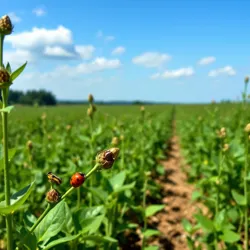Biocontrol Agents
Biocontrol agents are living organisms used to suppress the population of pests, pathogens, or weeds, thereby reducing the damage they cause in agricultural and natural ecosystems. This sustainable approach to pest management utilizes the natural enemies of pests, including predators, parasites, and pathogens, to maintain ecological balance and reduce reliance on chemical pesticides.
 An image showing the application of biocontrol agents in an agricultural field.
An image showing the application of biocontrol agents in an agricultural field.Types of Biocontrol Agents
Biocontrol agents can be categorized into several types based on their roles and targets:
-
Predators: These are organisms that hunt and consume pest species. A classic example is the ladybug, which preys on aphids in crop fields. Similarly, the predatory bacteria Bdellovibrio preys on other bacteria, providing a natural method of controlling bacterial populations in various environments.
-
Parasitoids: These are insects whose larvae develop inside or on the body of a host pest, eventually killing it. Parasitoids such as certain wasp species are commonly used in controlling insect pests.
-
Pathogens: These include bacteria, fungi, or viruses that cause diseases in pest species. For instance, the bacterium Bacillus thuringiensis (Bt) is widely used as a biological pesticide against caterpillars and other insect larvae.
-
Herbivores: These are animals that feed on weeds, helping to control unwanted vegetation. The introduction of specific beetles to control invasive plant species like the water hyacinth has been successful in various regions.
Advantages of Biocontrol
Biocontrol agents offer numerous benefits over chemical pesticides:
-
Environmental Safety: Biocontrol methods typically have a lower environmental impact, preserving biodiversity and reducing chemical residues in ecosystems.
-
Sustainability: They provide a sustainable approach to pest management by enhancing natural pest control mechanisms and reducing the need for repeated chemical applications.
-
Specificity: Biocontrol agents are often highly specific to their target pests, minimizing harm to non-target species and beneficial organisms.
Challenges and Considerations
Despite their advantages, the use of biocontrol agents comes with challenges:
-
Ecological Impact: The introduction of non-native biocontrol agents can sometimes disrupt local ecosystems if not carefully managed.
-
Effectiveness: The success of biocontrol agents can be variable, depending on environmental conditions and the presence of other competing organisms.
-
Regulation and Monitoring: The deployment of biocontrol agents requires stringent regulatory oversight and monitoring to ensure their safety and effectiveness.
Applications and Future Prospects
Biocontrol agents are employed in various sectors, including agriculture, forestry, and urban pest management. With advances in biotechnology and ecology, there is potential for the development of new and more effective biocontrol methods. Research into the use of genetically modified organisms and the integration of biocontrol with other pest management strategies continues to expand the possibilities for sustainable pest control.
See Also
- Predators of the Invisible World
- Microbial Food Web
- Thermo Gliders
References
- "The Role of Biocontrol Agents in Sustainable Agriculture," Journal of Pest Management, 2020.
- "Advances in Biocontrol Technology," Biocontrol Science and Technology, 2021.
- "Ecological Impacts of Biocontrol Agents," Environmental Biology Review, 2022.
As the demand for environmentally friendly pest control solutions grows, biocontrol agents stand at the forefront of sustainable agriculture and ecosystem management, offering a promising alternative to conventional chemical methods.